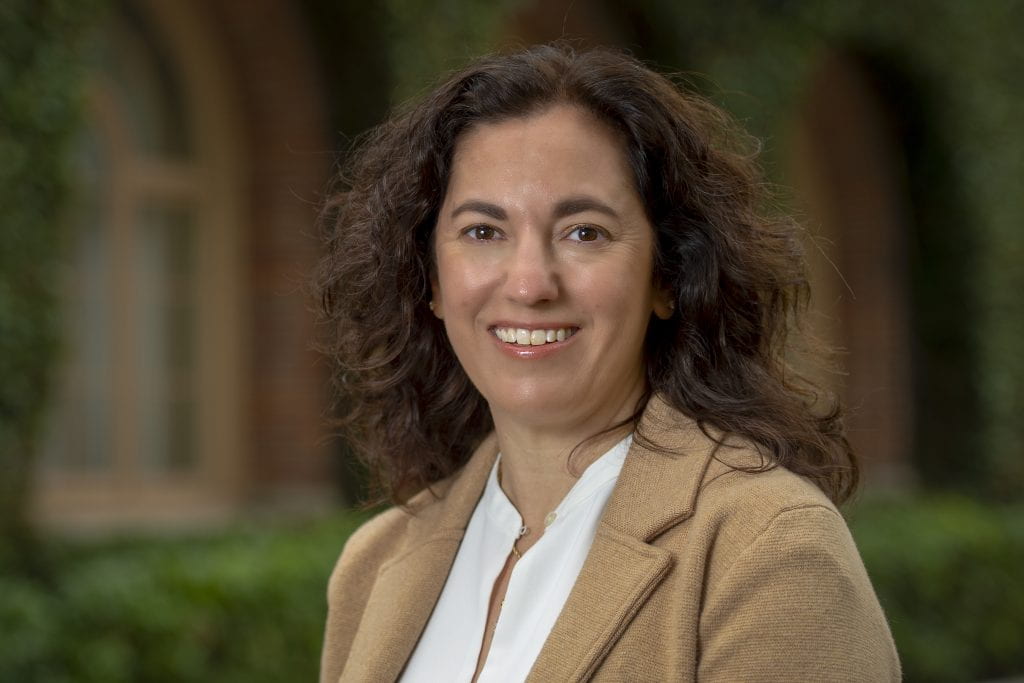
Shaping University Values by Pondering Her Own
By Lynn Lipinski
Renee Almassizadeh has had a lifelong fascination with the languages, cultures and peoples of the Middle East region.
Armed with bachelor’s and master’s degrees in the field and work experience at different think tanks, she joined the university as staff in 2015 to help get the USC Dornsife Middle East Studies Program off the ground.
What a difference nearly four years have made. The program has grown into a full-fledged USC Department of Middle East Studies. The freshman who enrolled during those early days are preparing to graduate as seniors. And Almassizadeh has seen her passion for all things Middle East expand into something even greater: a passion for higher education and its ability to transform students’ lives and help shape society.
It’s a dedication that has led her to work closely with students, and also to run for and win an election to represent staff interests on Staff Assembly. That her tenure as a staff leader occurred during a very challenging time at USC has only strengthened her commitment to the cause.
Voicing Staff’s Worth
If the past two years have convinced Almassizadeh of anything, it is that there is a need for a shift in USC’s culture.
She hears often from staff members that they feel under-appreciated by the university. Their reasons vary, she acknowledged, but it’s also a perception that she hopes is starting to shift, thanks to university-wide efforts to spark culture change efforts. She also points to Interim President Wanda Austin’s actions, including her public recognition of the important role staff plays: not just inpatient care at Keck Medicine of USC and in student lives on campus, but also through less visible but still critical functions like public safety, facilities management and civic engagement. It’s a point Almassizadeh often makes when speaking about staff.
“I see education as more of a holistic experience. Students spend more time out of the classroom than in it,” Almassizadeh said. They interact with staff for counseling, health care, library services, through affinity groups and others who help shape their experiences and provide guidance and support.
A Close-up View of Culture Change
Almassizadeh knows that her role as staff leadership on the President’s Culture Commission affords a close-up view to efforts to usher in large-scale improvements to how the university works that others don’t see. One of the biggest hurdles to the burgeoning culture change efforts underway now, she said, will be engaging with staff across units, schools and disciplines and convincing them to get involved.
As someone who thinks a lot of about staff concerns, Almassizadeh realizes that culture change has to happen not just at the macro- or university-level, but also within individual units and teams.
“You can have a really great manager and a really great day-to-day experience…and feel like you work within a good culture,” she said. But if at the micro- or team-level, the culture needs to be fixed, then it won’t matter if great things are occurring at the university level, because nothing will change day-to-day. Involving a deep bench of staff members will help ensure lasting change.
While she hears some cynicism or apathy from staff about the culture change efforts so far, she remains buoyed by what she’s seen so far.
“I’m truly optimistic that there are enough great people at all different levels and in all different capacities at this institution to create change,” she said. Our challenge will be to “bring as many people to the conversation as possible.”
Values are Key
The first thing tackled by the President’s Culture Commission has been the rollout of an online values survey by the Barrett Values Centre. The survey, which has been deployed by all sorts of organizations and even cities and countries, helps people identify their personal values, current organizational values and desired organizational values.
Curious, Almassizadeh took the short survey about her own personal values. (Anyone can take the free survey and receive a Personal Values Assessment.)
The results weren’t too surprising, but they have informed the way she thinks about her work. For example, a key value for Almassizadeh was the meaningful connections she forms with those around her, which make sense given her role in building relationships with the students who come to her office for counseling and advisement as well as the staff she represents.
Pausing to reflect on her values and how they manifest in her professional behavior was a powerful exercise and one that she hopes other staff members will embrace and find empowering.
“We have the opportunity to determine what we want the values of this university to be in the 21st century. Each of us can shape these values.”